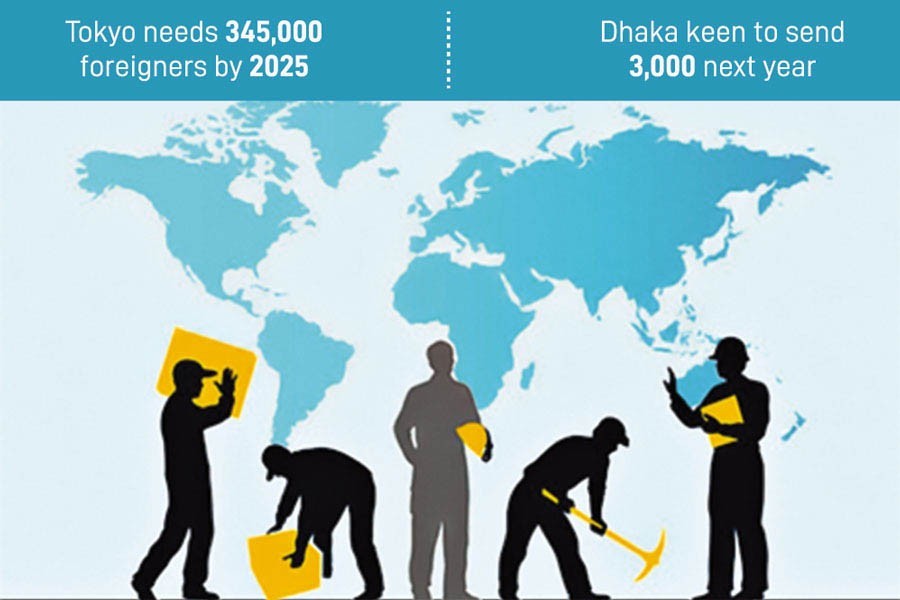
Published :
Updated :

Japan has emerged as a potential market for Bangladeshi workers as it can help increase employment opportunity and quality migration.
Officials at the Bureau of Manpower Employment and Training (BMET) say they are giving priority to tap this opportunity through sending more workers to this attractive job destination country.
Bangladesh has a target to send at least 3,000 workers to Japan for different sectors next year, says BMET director (training operations) engineer Md Salah Uddin.
Currently, foreign workers are in good demand in the East Asian nation that is willing to hire workers from Bangladesh.
Dhaka is keenly working to tap the potential properly, according to the official.
In 2017, expatriates' welfare and overseas employment ministry of Bangladesh and International Manpower Development Organisation of Japan (IM Japan) signed an instrument for training technical interns of Bangladesh in Japan.
On the other hand, Dhaka and Tokyo signed a memorandum of cooperation (MoC) on the recruitment of specified skilled workers (SSWs) in August 2019.
Bangladesh has been enlisted as the ninth source country for sending skilled workers to Japan following the signing of the MoC.
Japan, as the world's third-largest economy, will need some 345,000 foreign workers by 2025.
In line with the signing of the MoC in 2019, officials say, Japan will hire manpower from Bangladesh in 14 sectors and industries under two categories.
The act of sending technical interns has remained almost halted following the outbreak of Covid-19. Now it is gathering pace gradually, they add.
Under the deal with IM Japan, 178 Bangladeshi youths have so far gone to Japan as technical interns. They were employed in construction and care-giving sectors. A total of 53 workers are expected to fly to the country in July, and 345 others are in the pipeline.
Under the deal, Japan is hiring the interns in its construction, construction, automobile and care-giving sectors.
Employers are bearing the cost of migration for technical interns who earn 160,000-190,000 Japanese yen as monthly wages.
Besides, the government has started correspondence with the Japanese authorities concerned to send skilled workers under the MoC on the recruitment of SSWs.
A total of 32 technical training centres (TTCs) are entitled to run Japanese language course.
"We've already sent a letter to the TTCs to start skills training in 14 trades required for Japan-bound workers," cites Mr Salah Uddin.
They have requested the Japanese authorities to permit skills assessment test in Bangladesh, he says, adding that if permitted, they will be able to start sending SSWs soon.
"We'll be able to send 3,000 technical interns and SSWs to Japan in the next one year," he anticipates.
When asked, the official says the employer country will hire 1,000 interns each year.
Fourteen sectors and industries include caregiving, building cleaning management, machinery parts and tooling, industrial machinery, electrical, electronics and information, construction, shipbuilding, automobile maintenance, aviation, accommodation, agriculture, fisheries and aquaculture, and food and beverage.
Proficiency test on Japanese language and necessary skills on respective trade are the basic requirements for selection of an SSW for Japan.
Shakirul Islam, chairman at Ovibashi Karmi Unnayan Program (OKUP), suggests that the government emphasise sending workers there as Japan is a developed job market for migrant workers.
Such migration will help ensure standard occupation for skilled workers and enhance remittance income at homeland, he comments.


 For all latest news, follow The Financial Express Google News channel.
For all latest news, follow The Financial Express Google News channel.